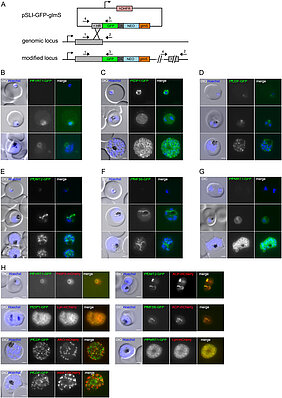PMRT1, a Plasmodium-Specific Parasite Plasma Membrane Transporter, Is Essential for Asexual and Sexual Blood Stage Development
11.04.2022PMRT1, a Plasmodium-Specific Parasite Plasma Membrane Transporter, Is Essential for Asexual and Sexual Blood Stage Development
Jan Stephan Wichers, Paolo Mesén-Ramírez, Gwendolin Fuchs, Jing Yu-Strzelczyk, Jan Stäcker, Heidrun von Thien, Arne Alder, Isabelle Henshall, Benjamin Liffner, Georg Nagel, Christian Löw, Danny Wilson, Tobias Spielmann, Shiqiang Gao, Tim-Wolf Gilberger, Anna Bachmann, Jan Strauss
mBio. 2022 Mar-Apr; 13(2): e00623-22.
Membrane transport proteins perform crucial roles in cell physiology. The obligate intracellular parasite Plasmodium falciparum, an agent of human malaria, relies on membrane transport proteins for the uptake of nutrients from the host, disposal of metabolic waste, exchange of metabolites between organelles, and generation and maintenance of transmembrane electrochemical gradients for its growth and replication within human erythrocytes. Despite their importance for Plasmodium cellular physiology, the functional roles of a number of membrane transport proteins remain unclear, which is particularly true for orphan membrane transporters that have no or limited sequence homology to transporter proteins in other evolutionary lineages. Therefore, in the current study, we applied endogenous tagging, targeted gene disruption, conditional knockdown, and knockout approaches to investigate the subcellular localization and essentiality of six membrane transporters during intraerythrocytic development of P. falciparum parasites. They are localized at different subcellular structures—the food vacuole, the apicoplast, and the parasite plasma membrane—and four out of the six membrane transporters are essential during asexual development. Additionally, the plasma membrane resident transporter 1 (PMRT1; PF3D7_1135300), a unique Plasmodium-specific plasma membrane transporter, was shown to be essential for gametocytogenesis and functionally conserved within the genus Plasmodium. Overall, we reveal the importance of four orphan transporters to blood stage P. falciparum development, which have diverse intracellular localizations and putative functions.


